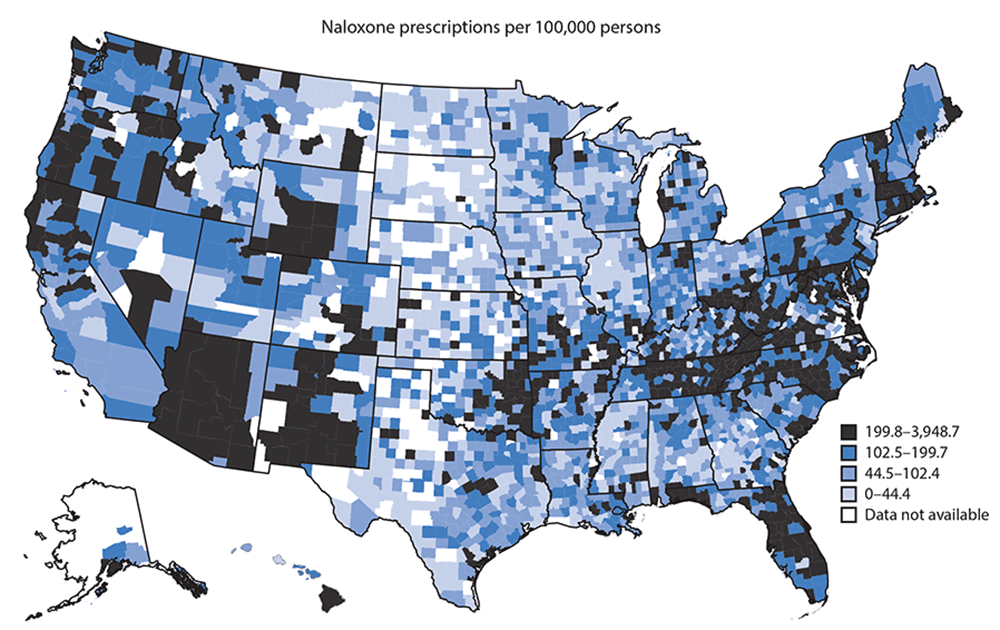Advertisement
Most Mass. Counties Have Among The Highest Rates Of Dispensing Overdose-Reversal Drug

Massachusetts has among the highest rates of dispensing naloxone, the drug that can reverse an opioid overdose, according to new federal data.
Among counties nationwide, Franklin County in western Massachusetts last year had the fourth-highest rate of prescriptions for naloxone — commonly sold under the brand name Narcan — with more than 2,200 prescriptions filled for every 100,000 residents.
Though lagging far behind Franklin County, eight other of the state's 14 counties were also in the top 25% for prescription rates across the U.S., according to the data from the Centers for Disease Control and Prevention.
Doctors, street workers and police say Narcan is the reason why Massachusetts' opioid overdose death rate is dropping. As drug dealers replaced heroin with the more powerful opioid fentanyl, some experts worried death rates would rise. But they dropped by 1% in 2018 and are down 4% since 2016.
"The only way I can interpret that is that we're just saving more lives," said Dr. Ruth Potee, medical director of addiction services for Behavioral Health Network in Springfield, in Hampden County, which last year had the highest rate of opioid overdose deaths. "People continue to use [opioids] but more people's lives are saved every day because of Narcan."
Potee says every inmate with a history of opioid addiction who leaves a jail in Franklin County is handed two doses of Narcan, as is anyone who leaves a detox program.
"We acknowledge that people will likely return to use," Potee said. "There is a lot of relapse and every relapse is a potential for death."
The number of prescriptions for naloxone doubled nationally from 2017 to 2018. More physicians are dispensing naloxone when they prescribe high-dose opioids that the CDC says put patients at risk for an overdose.
But co-prescribing is not routine. The CDC says there are 70 high-dose opioid prescriptions for every one naloxone script nationwide.
The CDC data includes prescriptions both written by doctors for specific patients, and those filled under standing orders. Massachusetts is one of dozens of states that have a standing order for naloxone — one prescription that works for everybody.
“As we aggressively confront what is the public health crisis of our time, CDC will continue to stress with healthcare providers the benefit of making this overdose-reversing medicine available to patients,” said CDC director Dr. Robert Redfield, in a statement.
There are many other gaps in the use of and access to naloxone. Not all police and firefighters in Massachusetts carry the drug. Some life insurers deny coverage to applicants who've been prescribed naloxone, although state regulators say the practice is discouraged in Massachusetts. And Boston Dr. Alex Walley says some insurers only cover naloxone for drug users, not their friends or family members who are trying to keep the person safe.
Advertisement
"But I'll hopeful that we're at a tipping point where the logistical access at a pharmacy is substantially improved and that the stigma targeted by public health campaigns is getting us to a point where this is becoming more mainstream," said Walley, a physician at Boston Medical Center's Grayken Center who signs the state's standing orders for naloxone prescriptions at pharmacies.
Walley says the state should consider requiring that doctors prescribe naloxone with high-dose opioids, as four other states have done, and might consider making naloxone available on the streets. (The VA now places naloxone in AED cabinets.)
A spokeswoman for Gov. Charlie Baker says his administration invested more than $7.6 million to improve access to naloxone last fiscal year and that a state naloxone training program has led to more than 23,000 overdose reversals since 2007.

